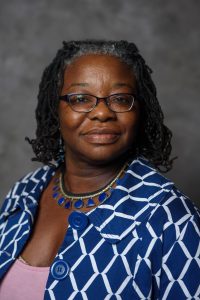
From the June 2021 Desktop News | Dr. Stephanie McClure has a longstanding interest in public health and increasing equitable access to healthcare for underserved groups. When the COVID-19 pandemic began, she was concerned about how the pandemic would affect these communities, but was unsure how her interest in contributing to theory concerning health disparities manifestations and effects would be of use in the emergency. But when she heard about the opportunity arose to be part of the CommuniVax project and explore experiences of the pandemic at the community level, she knew that she had to get involved.
CommuniVax is a nationwide project aimed at promoting equitable access to COVID-19 vaccination in populations that have disproportionately experienced the negative effects of the pandemic –Black, Latinx, and Indigenous communities. The project seeks to document the experiences of these communities with the virus, and vaccine access and uptake. The long-term aim of the project is to advance community-centric public health practice as a means of ensuring a more responsive, effective public health infrastructure and health care delivery system in the future.
“If you want to figure out how to reach a specific group, connecting with people in that group is necessary,” McClure said. “If you want to encourage adoption of a particular treatment or behavior, ask that community. What voices are most persuasive? What methods of communication would be effective?”
The project, which is spearheaded by the Johns Hopkins Center for Health Security at the Bloomberg School of Public Health and the Texas State University Department of Anthropology, is funded by a $2 million grant from the Chan Zuckerberg Initiative. These two institutions work with six local research teams located in different regions, gathering information that could increase vaccination efforts in their communities.
“We’ve learned that rolling out a generic national campaign is not an effective way to do public health,” McClure said. “So the planners of CommuniVax wanted to focus on specific communities in key regions. Alabama is ideal in a lot of ways—it has majority-minority counties, transportation issues, and poverty. The state has significant challenges with equity on all fronts, and that includes health equity. And because of the University presence, it made sense to base the southeastern research team here.”
The UA team is composed of five interdisciplinary researchers: McClure, the team’s principal investigator; Dr. Kathryn Oths, professor emeritus of anthropology; Dr. Bronwen Lichtenstein, medical sociologist and professor of criminology and criminal justice; Dr. Levi Ross, associate professor of health sciences; and Dr. Pamela Payne-Foster, physician and professor of community medicine and population health.
CommuniVax’s goal is to be a bridge for community input to state and local governments in the cause of vaccine equity.
“Early in the vaccine rollout, the primary issue was access, and we have addressed some of those issues,” McClure said. “Many people we have spoken with credited their ability to get vaccinated to the mobilization of the national guard to administer vaccines in the Black Belt. Those mass vaccination efforts are not drawing the crowds that they did back in March and April, because the issue now is that people want to ‘wait and see’ before being vaccinated, or state they are unwilling to be vaccinated.”
McClure says that vaccine hesitancy and refusal are influenced by several factors, from unanswered questions to misinformation to mistrust resulting from negative personal and historical interactions between communities of color and the health care delivery system.
“Some people are suspicious of the fact that the vaccines appear to have been developed very quickly,” McClure said.” ‘It’s too fast,’ they say. Some of the pro-vaccine people we have spoken with say that a lot of misinformation is circulated through social media, and people who are hesitant have shared stories of their experiences with COVID-19 that make them doubt that vaccination will be effective. To have a shot of vaccinating at least those who are hesitant, we have to know their concerns and address those concerns in a way that is relatable. That is part of what CommuniVax aims to do.”
To learn more about CommuniVax, visit their website. To sign up for a vaccine appointment, visit the Vaccine Finder website.